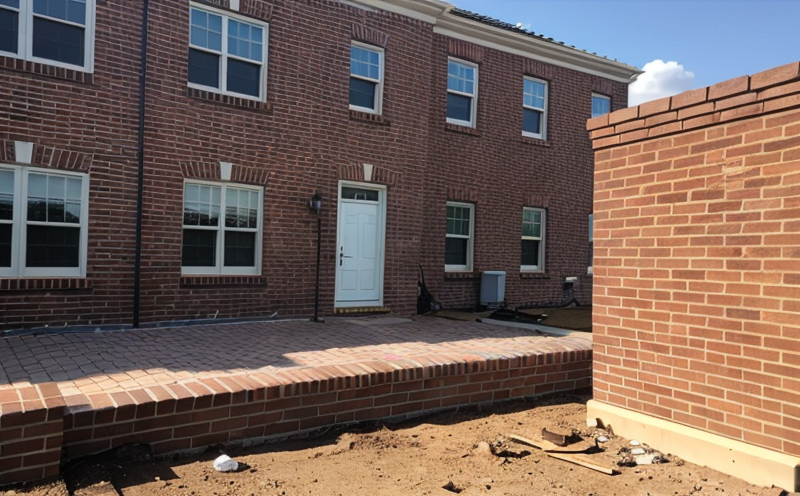ISO 10545 Resistance to Weathering of Bricks
The ISO 10545 standard is a critical tool in evaluating the durability and resistance to weathering of bricks. This test assesses how well bricks withstand exposure to environmental elements such as rain, wind, frost, and temperature changes over extended periods.
This procedure is essential for ensuring that building materials meet quality standards necessary for long-term performance and reliability. The test subjects bricks to a series of conditions designed to simulate real-world weathering scenarios. This includes freeze-thaw cycles, water immersion, and exposure to sunlight. Understanding the resistance to these elements helps in selecting appropriate brick types for various climatic zones.
The procedure is widely used by quality managers and compliance officers to ensure that products meet international standards. R&D engineers can use this test to innovate new formulations or improve existing ones. Procurement teams benefit from this information when deciding on the best suppliers and materials.
During testing, bricks are subjected to a series of environmental conditions designed to mimic real-world weathering scenarios. The test involves placing the brick specimens in a specially designed chamber where they undergo cycles of freezing and thawing, exposure to water, and drying. This process simulates the effects of natural weathering over time.
Once the tests are completed, the samples are visually inspected for any signs of deterioration such as cracking, chipping, or discoloration. The results provide valuable insights into the brick's resistance to environmental factors. These findings help in selecting appropriate materials that will withstand harsh conditions and ensure the longevity of buildings.
Understanding the parameters involved in this test is crucial for accurate interpretation of the results. Specimens are typically prepared by cutting standard bricks into specific sizes according to the ISO 10545 guidelines. The apparatus used includes a temperature-controlled chamber, a water supply system, and devices for monitoring environmental conditions.
The acceptance criteria specify that the brick should retain at least 85% of its original mass after undergoing the prescribed weathering cycles. This ensures that any significant loss in weight due to weathering is detected. Compliance with these standards indicates high-quality building materials capable of enduring challenging environments.
Why Choose This Test
The ISO 10545 test is indispensable for ensuring the durability and longevity of bricks used in construction projects. By simulating real-world weathering conditions, this test provides critical information on a brick's resistance to environmental factors such as rain, wind, frost, and temperature fluctuations.
- Ensures compliance with international standards
- Aids in selecting appropriate materials for specific climatic zones
- Supports R&D efforts aimed at improving material performance
- Facilitates informed procurement decisions based on tested durability
This test is particularly beneficial for quality managers and compliance officers who need to verify that building materials meet stringent quality standards. For R&D engineers, it offers a valuable tool for innovation and improvement of existing formulations. Procurement teams find this information invaluable when sourcing the best suppliers.
The ISO 10545 test is widely recognized as a benchmark for evaluating brick resistance to weathering. By adhering to these procedures, construction professionals can ensure that their projects are built with materials capable of enduring challenging environmental conditions, thus enhancing overall project quality and longevity.
Environmental and Sustainability Contributions
The ISO 10545 test plays a crucial role in promoting sustainable building practices by ensuring the durability and longevity of bricks. By selecting materials that can withstand harsh environmental conditions, construction projects benefit from reduced maintenance costs and extended service life.
- Reduces waste generation through prolonged product lifecycle
- Promotes resource efficiency by optimizing material performance
- Contributes to energy savings in building operations
- Fosters eco-friendly practices by encouraging the use of sustainable materials
The test's focus on durability helps minimize environmental impact, as it reduces the need for frequent replacements and repairs. This aligns with broader sustainability goals within the construction industry.
By choosing bricks that pass this test, builders contribute to more resilient structures capable of withstanding various climatic conditions. Such materials play a vital role in creating sustainable urban environments that are better equipped to handle natural disasters and climate change impacts.
Competitive Advantage and Market Impact
The ISO 10545 test offers significant competitive advantages for businesses involved in the construction industry. Compliance with this standard demonstrates a commitment to quality, reliability, and sustainability, which are increasingly important factors influencing customer choices.
- Enhances brand reputation through consistent product performance
- Attracts environmentally conscious clients seeking sustainable solutions
- Supports strategic business decisions based on rigorous testing protocols
- Paves the way for market differentiation by offering superior products
By adhering to ISO 10545, companies can position themselves as leaders in quality and innovation. This not only strengthens their market presence but also fosters long-term relationships with customers who value durability and environmental responsibility.
The test's rigorous nature ensures that products meet high standards of reliability, making them attractive options for international markets where stringent quality requirements are common. This can lead to increased sales and broader market penetration, ultimately boosting business growth and profitability.





